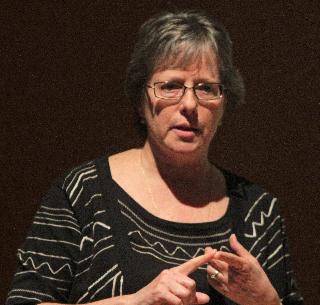Scientists help clean environment
The women, science and sustainability forum recognized three women scientists in the biological sciences department and happened to fall on the 100th anniversary of the International Women’s Day.
Ann Fritz, assistant professor of biology, moderated the discussion and led the scientists in the discussion of their research.
“In biology we use sustainability to characterize healthy, diverse, long-lived eco-systems such as prairies, forests, wetlands and we humans certainly derive benefits from living in vital, productive ecosystems in healthy environments,” Fritz said.
Fritz organized the panel so where one left off the discussion, the next scientist could continue on the same topic.
Karen Gaines, chair of biological sciences, began the discussion by speaking of her work in toxicology and how it affects wildlife.
“As more women go into the sciences, I think we’re bringing the perspectives and limits,” Gaines said.
Gaines’s specialty in environmental science and wildlife has led her to scientific experiments in how toxins relate to wildlife and the environment.
“Species are defined by their niche,” Gaines said. “When there is stress, it may be toxicological. It could be in terms of land use.”
The species that are affected have the ability to expand and adapt their niche to their environment, Gaines said.
Gaines is working on a project where the bi-product of corn may have toxins in the ash and is focusing on wildlife is an adverse landscape.
“It’s corn around here, but what if we start growing biofuels? How is that going to change things and how is wildlife going to respond?”
Janice Coons, professor of biological sciences, focuses her research on native plants and the restoration of habitats.
“We work with endangered and threatened species,” Coons said. “At one time they were plentiful, but due to habitat destruction there are very few of them left.”
Coons focused her discussion on how to rebuild restoration areas using native plant species.
Throughout her discussion, she covered the survival strategies which are necessary for plants, restoration projects and the outreach programs which help assist with native species.
“From a stand point of sustainability, we need to figure out, what are the limitations,” Coons said.
Among the strategies Coons and her students look at seed biology and flower biology.
“The first thing you’ll see in a germinating seed is the radical of the root poking its way out,” Coons said.
Coons studies how to grow plants and studies how plants grow through seed growth.
“We often look at floral structures,” Coon said. “We look at what it takes to initiate flowers. Some species respond to either long days or short days. Sometimes we look at when they bloom; just looking at the number of flowers per square meter will indicate that.”
Coons and her students do restoration work for the Missouri Department of Conservation who sends the department seeds. Her students then figure out how to germinate the seeds.
She also has worked with the Illinois Prairie Reserve where they are working to preserve a species of dragonfly.
Nida Sehweil-Elmuti, instructor of biological sciences, finished the discussion of women and science with a global perspective on Palestine women overcoming barriers and sustaining their environment.
A security fence was built not long ago to separate Israel from neighboring territories, Schweil-Elmuti said.
This fence was built in order to keep the occupants safe on the other side.
“This monstrous wall actually created a prison for both populations, not to mention inhumane barriers to the Palestine population,” Schweil-Elmuti said.
The women of Saudi Arabia are expected to overthrow the monarchy because their rights are really repressed, Schweil-Elmuti said.
“Women are behind the throw of the dictator of Egypt,” Schweil-Elmuti said.
There are two garden sites on Eastern’s campus which students can see native species. Prairie Garden is located west of Lawson Hall and north of University Court; Woodland Garden is located by Eastern’s football field.
Jennifer Brown can be reached at 581-2812 or jebrown2@eiu.edu.
Scientists help clean environment

Janice Coons, a member of the biology department, speaks during “Women, Science and Sustainability: A Panel Discussion” in the Doudna Lecture Hall on Tuesday. The members of the panel discussed different projects they had been or are currently a part of





































































